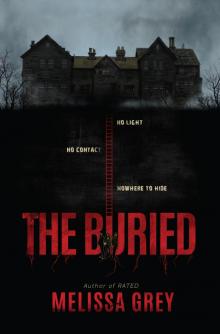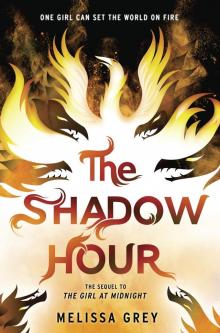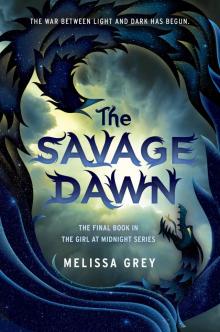- Home
- Melissa Grey
Rated Page 6
Rated Read online
Page 6
The wellness quota was served by offering the entirety of the student body a free period in the middle of the day, during which no classes were scheduled. It was officially called the Rest Period and unofficially called Siesta, but few actually rested during it. True, some distressed students might grab quick naps on any soft, quiet spot they could find, but Bex Johnson was not one of those students.
Not a day went by without at least one scheduled activity taking place during her Rest Period.
Monday: Flute lessons in the new music hall.
Tuesday: Planning meeting for the Lantern, Maplethorpe’s student-run newspaper, of which Bex was the editor in chief. (She’d held this role since her sophomore year, an unprecedented move for an underclassman, but she’d refused to settle for any lesser position.)
Wednesday: Mathletes practice.
Thursday: Speech and debate team.
Friday: Linguistics club. (Bex was merely treasurer of the club, a fact that made her mother frown whenever she remembered that there were two offices—president and vice president—ranked above her daughter’s post.)
After Maplethorpe was stricken by a vandal armed with a can of bloodred spray paint, Bex spent her Tuesday Siesta calling to order the year’s first meeting of the Lantern.
All anyone could talk about was the graffiti. It had been wiped from the doors, but not from the minds of Maplethorpe students. Talk of it was quickly shushed by teachers in classrooms and hallways, but there was no way to truly silence several hundred teenagers who had just witnessed the juiciest bit of gossip to hit the academy since Elizabeth Reynolds, student council vice president, had a nervous breakdown two years ago and attempted to blow up her smartwatch in the chem lab using a highly combustible potassium chlorate solution.
Melody bumped Bex’s shoulder as they sat at two desks they’d pushed together to bend their heads over Bex’s tablet. Melody’s position at the Lantern wasn’t exactly editorial in nature—she wrote the weekly horoscopes—but she attended meetings with Bex when her schedule allowed.
“Looks good, Bex,” said Melody.
Bex put the finishing touches on the mock-up of Friday’s front page. There was only one event that was newsworthy enough for a full-page splash, and everyone knew it.
Bex stared at the blank space over the article she’d written up in the stolen snatches of time between classes. “We need a photo.”
“Oh!” Melody slapped her hand against the desk, jolting Bex’s carefully arrayed set of colored pens off the surface. Bex frowned at her as she bent down to pick them up, but like all her frowns, it had minimal effect on Melody.
“I forgot to tell you; I saw that kid taking photos of the graffiti, the one with that hipster camera. I told him to come in today to let us take a look at his pictures. Thought we could use one.”
“Good thinking.” Bex once again lined up her pens in a neat row, assorted by hue. “Which kid?”
“The weird one. You know. With the floppy hair and the long blank stare and the benign antisocial tendencies.”
As if summoned by the incomplete (but, Bex noted, not wholly inaccurate) description, a student Bex had never encountered before appeared in the doorway. His hair was indeed floppy and he did hunch his shoulders slightly, as if engaging in even this minor social interaction caused him physical pain. But his stare wasn’t blank so much as guarded.
“Hey!” Melody hopped out of her seat and twirled, arms extended. “Welcome to the illustrious offices of the Lantern.” She gestured to Bex with a grand sweep of her arm. “And this is our benevolent dictator, Bex Johnson.”
“Hey,” the boy said, hoisting the camera strap higher on his shoulder. The device was distinctly vintage. “I’m Noah.”
“Hi, Noah.”
“Um, Melody said you wanted photos? Of the graffiti?”
“Yeah,” Bex said. “If you have some high-res ones, that would be great.”
He swung his backpack off and pulled a thick folder from it. “I developed some last night, actually. I couldn’t wait.”
Noah grew slightly more animated as he spoke about his work, flipping through each photograph as Melody and Bex admired them.
They were good. Very good.
Bex pointed to one that caught her eye. The framing was perfect. Students milled about the vandalized doors, their faces all pointed to the scene of the crime. A teacher stood off to the side, hands on her hips, brow pinched in consternation. “Do you mind if we use this one?”
“Yeah … I mean, no. I don’t mind,” Noah said. “It might be kind of cool actually. I never really show these to anyone.”
“Never?” Melody asked. “That’s a crime. You have talent. And I almost never admit when anyone else does.”
A modest smile worked its way onto Noah’s face. It softened the sharpness of his bone structure, making him look even younger. “Thanks.”
Before Melody could flirt with him further, the door opened. Bex turned to see Mr. Donahue, the Lantern’s faculty advisor, enter the room. Normally, his hands were full of professional newspapers from across the country he liked to share with his students as examples of the type of journalism they should aim for. But today, his hands were empty and his expression tight.
“Ah, Rebecca. You’re here already. Good. Good, good, good,” Mr. Donahue said. “Oh, and we even have a new face. Always nice to see.”
He didn’t sit down at the large desk at the front of the room like normal. He stood, hands hanging awkwardly at his sides.
“Is something wrong, Mr. Donahue?” Bex asked.
“No, no. Well. Yes, I suppose. But nothing truly terrible, I promise.”
“Then,” Melody prodded, “what is it?”
“Here’s the thing,” Mr. Donahue said.
Bex steeled herself. A thing, when delivered in that tone of voice, was rarely “nothing truly terrible.” Donahue looked like he was about to reveal their ratings had dipped by five points each.
“The school’s administration has decided to suspend publication of the Lantern for the time being.”
Melody jerked back as if struck. Ever the dramatist. “What?”
“Mind you, the hiatus won’t affect the titles you include on your college résumés. The Lantern will be lit once more, don’t you worry.” He smiled at his own turn of phrase.
“Why?” Bex asked. She hadn’t displayed the immediate, knee-jerk reaction Melody did. It simply wasn’t in her nature. But something cold and hard had formed in her gut at the news, and it worked its way up her throat and out of her mouth in the stoniest single-word inquiry she had ever uttered.
“Well, you see, it’s due to the rather unfortunate incident that happened this week. Certain extracurricular activities will be suspended until the school can conclude its formal investigation into the crime.”
It was technically a crime, Bex supposed, but it had seemed like a relatively harmless one. Just a senior having a bit of ill-advised fun. There was at least one every year.
“But that isn’t fair,” Bex said.
Donahue blinked at her, surprised. She had never talked back to a teacher before. Not once, in all her years of grueling education.
“I understand that you work very hard here, Rebecca,” said Mr. Donahue, “but this isn’t about you.”
The words stung. She wasn’t being selfish. She wasn’t. She simply didn’t understand why they were being penalized for a crime they hadn’t committed.
Donahue was already inching toward the door, his reluctance to answer any more of Bex’s questions written in the stiff lines of his posture.
“I’ll be sure to let you know when the suspension has been lifted. Until then, consider yourselves free to rest.” The cheer in Donahue’s voice was so obviously forced, Bex had to suppress the urge to roll her eyes at him. Eye-rolling a teacher was a quick way to take a small hit to one’s rating. “It is Rest Period after all.”
With that, he was gone, leaving Bex, Melody, and Noah to stare at the door slowly swing
ing shut behind him.
“Well, that was amazingly weird.” Melody did always have a penchant for stating the obvious.
“They don’t want us talking about it,” Bex said. It was the conspicuous subtext of Donahue’s announcement. Maplethorpe wanted to make sure it controlled the narrative surrounding the unprecedented act of vandalism. Perhaps they wanted to erase it altogether.
“But why?” Noah asked.
“That,” Bex said, “is the question.”
Noah had always been a healthy child. He was small for his age and prone to injury because of an innate clumsiness he never seemed able to shake, but otherwise healthy. The only time he’d ever been admitted to a hospital was when he had fallen out of a tree at the age of twelve and broken his leg. He’d climbed it to hide from a group of kids who used to call him Nerdy Noah, because kids were clever like that. Unfortunately for Noah, they’d decided that his small stature and thick-framed glasses (which he’d since replaced with contacts) made him the perfect punching bag. Fortunately for Noah, they hadn’t bothered to look up as they’d passed under the tree’s branches, hunting their prey. Finding no one to torment, they’d settled under the tree, backs against the trunk, and played an interminably long game on their phones. From what Noah could hear from fifteen feet above their heads, it was some kind of multiplayer fighting game and none of them were particularly good at it.
Eventually, the kids grew bored and left, but by that point Noah had been in the tree for two hours and his muscles were stiff and unresponsive. Shimmying down proved a significantly greater challenge than climbing up. One wrong step and he plummeted to the ground, breaking his fall with the tibia of his left leg. His phone was smashed on impact, rendering it useless.
So he lay on the ground for fifteen excruciating minutes until his little sister, Cecelia, found him. Cece was only seven at the time. He was supposed to have been watching her as she cavorted in the nearby playground, but he’d failed in his most fundamental duty as a brother. Cece, on the other hand, proved herself the better sibling. Not only had she summoned a passing adult to call their mother, but she hadn’t even tattled about Noah’s negligence. Ever since then, they’d been ride or die.
Despite the five-year gap in their ages, Noah often felt that Cece was his best friend. He took her to the movies, even if the animated fare she preferred made Noah want to drown himself in the jumbo popcorn they always ordered. He saved up his allowance so they could eat like kings at the pick-and-mix candy station at the mall. They’d even created their own shared language—a sloppy combination of pig Latin and the rudimentary Spanish Noah learned in middle school. And she’d held his hand at the hospital when he cried as they were applying the cast to his broken leg.
Noah had worn that cast for weeks. The most popular he’d ever been in school was the Monday after the fall. All the girls in class wanted to sign his cast. One of the boys (of the same group who had driven him up the tree to begin with) gifted Noah with a crudely drawn example of the male anatomy. One of the girls in his class (Melody or Melanie, Noah was as terrible with names as he was good with faces) had thoughtfully covered it up with a large, rainbow unicorn.
But despite a relatively healthy youth, Noah was far more familiar with hospitals than most people his age. His little sister hadn’t shared Noah’s genetic fortune. Cece had been diagnosed with acute lymphoblastic leukemia at the age of eight and spent her childhood in and out of hospitals. These days, it was mostly in. He was thirteen when he first asked his parents if he could give Cece his own bone marrow. They’d shared a look that seemed to say a great deal of things, but all they’d told Noah was that one had to be eighteen in order to donate.
And so he waited. Until today. The day after his eighteenth birthday, he went to the hospital—without his parents, who were both at work—to discuss donation with Cece’s primary oncologist, Dr. Reginald Lowe. Dr. Lowe offered Noah a smile and a consent form for the blood test, to see if Noah was a match.
He sat in the stiff-backed chair in Dr. Lowe’s office, the buzzing in his ears overpowering the sound of Dr. Lowe’s calm, steady voice. It was a good voice for a doctor who worked with terminally ill children. It was smooth and deep and Noah was sure people found it reassuring.
In that moment, he didn’t feel reassured. He was unmoored.
“Noah?” Dr. Lowe’s brow furrowed in what looked like concern, but his brow was almost always furrowed, so it was hard to tell. “Are you listening to me?”
“Yes,” Noah lied.
Well, it wasn’t entirely a lie. He had been listening, at the start of the conversation. Only he’d stopped a few sentences in.
He wasn’t a match.
Cece needed a donor, and Noah was not a match.
Dr. Lowe folded his hands over the papers on his desk, the ones that had declared Noah unfit to be Cece’s donor. “I know this must be hard to hear, and I commend you for trying, but it was always a long shot.”
Noah blinked. “A long shot?”
Dr. Lowe nodded. It was a good, sage nod that went with his deep, soothing voice. Noah wondered if the doctor practiced these incredibly soothing expressions in the mirror before he left for the hospital in the morning. Or perhaps the repeated work of delivering the worst possible news to families with sick children was practice enough.
“Matches are more likely to be found within families, for the most part. Siblings are usually most likely to match.”
“One in four,” Noah said. His voice sounded distant, as if it was echoing around in his skull after someone else had spoken.
“Excuse me?”
“There’s a one-in-four chance of siblings being a bone marrow match,” Noah said, though why he was explaining this to an oncologist of all things seemed the height of absurdity. “I looked it up. I did all the research.”
One in four was a good chance, but it left a 75 percent chance that Noah wouldn’t be a match. Still, he’d felt so certain.
Dr. Lowe nodded again, even more slowly this time. “For biological siblings, yes.”
The buzzing in Noah’s ears swelled to a feverish concerto.
Biological siblings.
“But I’m her brother,” Noah said, though the truth was already poking holes in the shield of Noah’s certainty.
Biological, biological, biological.
The word felt damning.
Dr. Lowe’s hands unfolded. Folded again. Unfolded once more. He pressed his palms flat to the papers on his desk.
“Noah, have your parents discussed your adopt—” He didn’t finish this question. He didn’t have to. “I apologize. I assumed you knew.”
“I’m her brother.” Noah was speaking only to himself now, not to Dr. Lowe. Repeating it wouldn’t change a thing, but his mind was clinging desperately to the lie he’d believed his entire life.
“You are her brother,” Dr. Lowe said softly, insistently. “Cecelia is your sister, and she loves you very much. Nothing will change that.”
Noah blinked again. He must have looked so slow and stupid and dumbstruck.
“Blood doesn’t make a family,” Dr. Lowe said. And then, sensing perhaps that he had wildly overstepped his bounds, he added, “You should speak to your parents, Noah.”
Noah nodded. It was not a good, sage nod like the doctor’s. It was shallow and too quick, and it made him feel slightly nauseated.
Noah’s hands tightened on the stuffed animal in his lap. It was bright green and looked like a cross between a chinchilla and a cat. He’d picked it up on his way to the hospital after spotting it in a shopwindow. It was an alien companion from some video game Cece liked, cute in a weird, extraterrestrial sort of way. Cece lived for stuff like that. He’d brought it with him to Dr. Lowe’s office, hoping that he would be able to visit Cece afterward to convey the good news.
But he didn’t have any good news. He hadn’t told her he was testing his bone marrow. He hadn’t even told his parents. Maybe if he had, this whole conversation with Dr. Lowe would have
been avoided. Maybe they would have told him themselves. Or maybe they had never planned on doing so. Maybe they’d intended for Noah to live his life without this vital piece of information about his own biology.
His biology wasn’t their biology.
His blood was not their blood.
Blood doesn’t make a family. And it didn’t. Noah knew that family was about a lot more than the womb in which one had been carried. But the information sat in his stomach like a hard and indigestible lump.
It remained hard and indigestible the entire bus ride home, the dumb green space chinchilla thing still in his hands. He hadn’t gone to see Cece. He wasn’t sure how to face her, if he’d be able to school his expression into something normal and comforting for her sake. She never wanted to be treated like she was sick, and Noah mostly excelled at that, but he didn’t trust his own shifting emotions. He wasn’t angry. He wasn’t even particularly sad, beyond the sadness that had come with knowing he couldn’t help Cece. He wasn’t sure what he was feeling, but he was sure that he was feeling a great deal of it.
His parents were still at work by the time he arrived home. Noah didn’t bother going upstairs to his bedroom to change out of his blazer and slacks, despite the fact that it was one of the greatest pleasures in his life. The fabric of the blazer itched and the slacks made him feel like the dweeb he probably was. He didn’t even stop to grab a snack from the kitchen as he did every day after school, despite the fact that he’d skipped lunch in favor of snapping candids of the students of Maplethorpe around campus. He was afraid that if he put anything in his stomach, it would rebel against the great, unnameable feeling and be expelled from his body immediately.
Noah made straight for the darkroom he and his dad had built in the basement two summers ago. Cece had just been admitted for another lengthy stay at Magnolia Children’s Hospital, and having an activity to occupy them had benefited both Noah and his father.

 Rated
Rated The Buried
The Buried The Shadow Hour
The Shadow Hour The Savage Dawn
The Savage Dawn